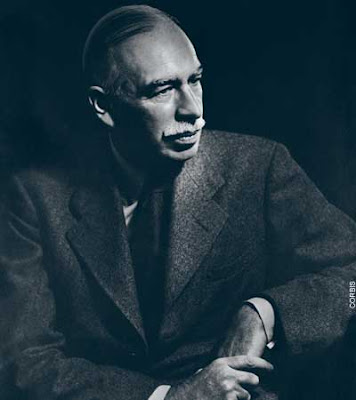
Keynes, who died in 1946, made his biggest impact in the third quarter of the twentieth century. It is true to say that many of the great thinkers and teachers leave their biggest mark after their death.
It is said that the recovery from the Great Depression in the 1920's was due to the adoption of Keynesian policies, however this was not actively recognised at the time. During the 50's and 60's there was a noticeable boom in the economy and bad years were rare and not so bad. This boom is by some associated with Keynesian policies, however some associate it with the combination of technological advancements and socialism. But when the economy started to falter in the late 60's, it seemed that instead of producing steady economic progress these policies had produced inflation.
Keynes expertise were in the narrow and technical field of monetary theory: what money is and what it can do. He believed that money is a commodity like any other and has a price determined by supply and demand, e.g. the interest rate. If people wanted money, but there was a choked off supply, then interest rates would rise and if you flooded the economy with extra money then interest rate would fall.
Classical economists use the rising and falling of interest rates is one of the key determiners od the rate of economic development and believe that the value of money is central to economic prosperity and growth.
On the contrary, Keynes said the lack of money supply could choke off the growth of the economy and it was necessary to decrease the value of money to keep up with the amount of goods in the real economy.
The Keynes theory falls into three parts
1. The effect of investment on income and employment - the Multiplier theory
2. The effect of interest on investment - the Marginal Efficiency of Capital
3. The effect of money supply, or of monetary policy, upon rate of interest - Liquidity Preference
As the most influential economist of the 20th century, Keynes attracted a lot of criticism. As he was seen as being anti establishment he received most of that criticism from the right. However, whilst he was trying to persuade them of the benefits of a more progressive policy, he received even more criticism as he was seen as a supporter of capitalism.
One of Keynes biggest critiques was Friedrich von Hayek who asserted that the Keynesian model of a large and active state taking a major role in the economy is a revival of Feudalism and a step back towards the dark ages of socialism, etc.
Hayek's book 'The Road to Serfdom' Hayek is refering the to socio-economic condition known as 'serfdom'. Serfdom is the socio-economic status of unfree peasants under Feudalism - Feudalism being a political, economic or social order which resembles a medieval system.
Hayek and Freeman said that the economic boom was basically one big party and deflation was necessary as the boom was going to have to be paid for eventually.
Keynes managed to save the capitalist economy from the great depression, however then subsequently managed to destroy capitalism by devaluing money and undermining social values.
Books used:
Th Crisis In Keynesian Economics by John Hicks
A Guide to Keynes by Alvin H.Hansen
The Road to Serfdom by Friedrich von Hayek

No comments:
Post a Comment